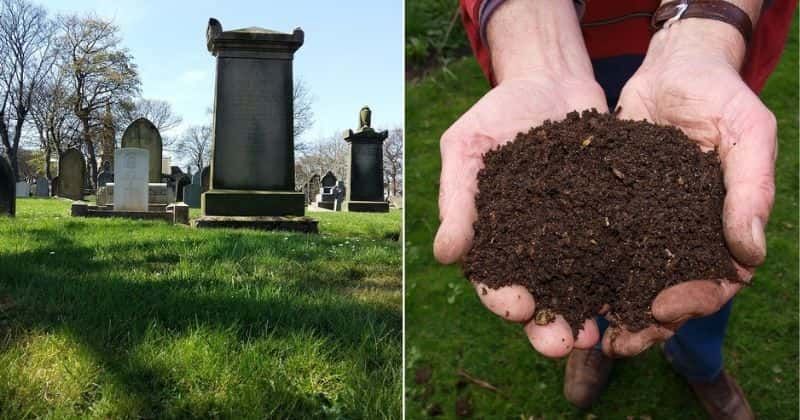
Human bodies will soon be “composted” in Washington state. Photo via McGill Media
The state of Washington will become the first state to legalize human composting when its new bill SB 5001 goes into effect on May 1, 2020.
While the move drew widespread support, passing 80-16 in the state’s House of Representatives and 38-11 in the Senate, the ramifications of what could happen following its passage and implementation are currently being hotly debated by natural health enthusiasts and everyday people alike.
The bill will legalize the processes of “natural organic reduction” and alkaline hydrolysis (also known as “liquid cremation”) as acceptable means for the disposition of human bodies, as reported by The Seattle Times.
Once it goes into effect, the new law will allow for the Recompose project to begin in Washington.
The project aims to build the first “organic reduction” funeral home in the country, a place where bodies can be buried without embalming caskets or headstones.
There’s just one major problem with this new approach according to some natural health advocates, however: this “organic human fertilizer,” as it’s being called, could very well become widespread in the environment by way of the soil, sewers, wind, and other avenues, and it could eventually be sprayed on crops due to the practice of using “biosolids” in the state, which also includes the use of human feces.
Human Remains Could End Up on Crops in Washington State
Is it fear mongering, or a valid concern?
Recently, the website Newstarget.com, a branch of the Natural News alternative health website, wrote an article connecting the dots between the new push for human composting in The Evergreen State and the very real possibility that dead human tissue could end up being sprayed on food crops.
“…Is it really a good idea to spread liquid sludge made from dead humans all over our food crops? Because that’s exactly where much of it will go, especially when “liquid cremation” ends up being flushed down the drain or toilet and into the local sewer system,” Ethan Huff wrote according to the article.
“As revealed in the Biosludged film, wastewater all across the country is now being “recycled” and spread all over farmland, which means whatever’s in it is being absorbed into the food supply.
“If America now begins ‘recycling’ human beings as liquid rather than simply burying bodies or cremating them into ash, as has traditionally been the case, then these remains will almost certainly end up being converted into recycled ‘biosludge’ and spread as ‘fertilizer’ on food crops,” the article continues.
A retired cardiovascular ICU nurse who testified in favor of the bill, Wes McMahan, said he’s “very much in favor of the composting of human bodies,” and also said he would like to create a food forest some day, “so my grandchildren will know where food comes from,” — he said.
While the Newstarget article seems to take his statements as evidence that composted human remains could eventually become part of the soil in food growing areas, it’s still not known exactly how much of this human-based material will end up in the food supply, drinking water, and other sensitive areas, or how much of it will end up in the biosolids spread on food crops.
Lynne Carpenter-Boggs, a soil scientist at Washington State University, said after a pilot test with six Recompose human volunteers that their bodies were composted into “clean, rich, odorless soil that passed all federal and state safety guidelines for potentially hazardous pathogens and pollutants, such as metals.”
In other words, human bodies really are going to be turned into soil in Washington state.
And if nature takes its course, as it always does, there’s a very real possibility that at least some of this dead human tissue will end up being consumed by living human beings in a roundabout way, at some point over the course of the food growing cycle.
What do you think of the passing of the use of human remains for “composting?” Let us know in the comments section below, and be sure to share this article if you know someone else who may be interested or concerned.
RELATED READING: Millions of Tons of Sewage Sludge are Being Used to Grow Food in the U.S. – Here’s How to Avoid It
Thanks for installing the Bottom of every post plugin by Corey Salzano. Contact me if you need custom WordPress plugins or website design.




